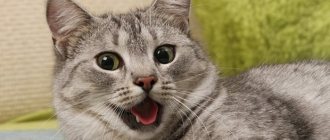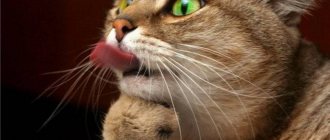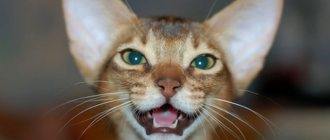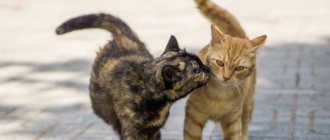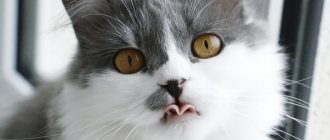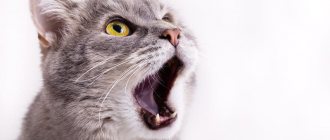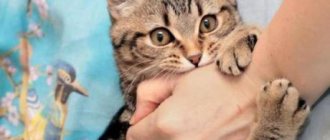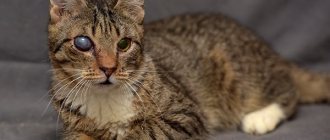Natural "refrigerator"
A cat's tongue is simply indispensable in hot weather.
By licking the surface of the fur coat, the purr reduces the air gap between the skin and the surface of the fur, thereby promoting better cooling of the body. When it becomes completely unbearable, the animal sticks out its tongue and begins to breathe quickly. Moisture evaporating from the surface of the tongue helps further reduce body temperature. Many of us have cats or cats living at home. Some are purebred, some are not. However, for all representatives of the cat family, we take this fact for granted, without even thinking about the nature of this phenomenon. Why do cats have rough tongues? Why do they need such a language and what functions does it perform? Let's answer these questions.
Heat
The main physiological reason why a cat sticks out its tongue is temperature regulation. The animal protrudes the organ to reduce discomfort, for example, during heat. This prevents the development of heat stroke. In this case, the owner should take the cat to a cool place and pour water on it.
But a cat's tongue sticking out can also be a signal of high body temperature. To understand whether your pet is suffering from heat or is sick, you need to figure out what temperature is considered normal in cats.
The normal temperature for a cat is 38-39 degrees. But don’t panic right away if the indicator deviates slightly from the norm. Here are the common reasons for the thermometer to shift:
- immediately after sleep, the thermometer drops by a couple of divisions;
- in the evening the cat’s body temperature will be higher than in the morning;
- Kittens have a slightly higher temperature than adult animals.
If the temperature rises due to illness, you should not self-medicate - the animal should be taken to the veterinarian.
Diseases
Veterinarians identify the main reasons why a cat sticks out its tongue:
- allergies that cause swelling of the throat;
- inflammation of the gums, mouth;
- dental diseases;
- amyotrophy;
- improper functioning of the salivary gland;
- skull injuries.
You can often see a cat with its tongue hanging out after anesthesia. During this period, the animal cannot yet control its jaw independently. The oral cavity closes completely only 24 hours after surgery.
Infections
A protruding tongue can be observed in cats in the case of infectious diseases such as rhinotracheitis, chlamydia and calcivirosis. In this case, animals may exhibit the same symptoms as in the case of respiratory disease. In addition, pets may have bowel movements and purulent discharge from the nose and eyes. The infection can also cause swelling in the mouth, causing the tongue to fall out of the mouth.
Important! If the cat begins to show aggression, it has profuse salivation, an open mouth and bulging eyes, this may indicate the presence of rabies.
In the case of an infectious disease, the animal also behaves strangely
Tumors
Oncology of the oral cavity is one of the most dangerous causes of a protruding tongue. If there is plaque, bleeding, bad breath, a hoarse voice, problems chewing or swallowing, or painful mouth ulcers, your pet needs immediate medical attention.
Note! A cat can stick out its tongue not only due to a malignant tumor, but also in the case of polyps located in the oral cavity
Swelling of the larynx due to allergies
Sometimes a similar reaction of an animal can be observed in case of allergies. The most common allergens are medications or food consumed. As a result, swelling of the larynx may occur. Symptoms include enlarged palate and tonsils, respiratory problems (infrequent, deep and slow breaths may be accompanied by coughing), slow heartbeat, problems swallowing, hoarse voice and restlessness.
Respiratory diseases
Sometimes cats stick out their tongues and breathe like dogs due to diseases such as rhinitis, ARVI, tracheitis, pneumonia and bronchitis. The main signs of the disease are difficulty breathing, coughing, wheezing when inhaling and exhaling, wheezing, lack of appetite, and nasal discharge. Temperature may also rise and apathy may appear.
Jaw injury
If there is no appetite, excessive salivation and prolapse of the tongue, the cat should be checked for a dislocated jaw. In case of bilateral dislocation, the pet is deprived of the ability to close its mouth. If a unilateral dislocation occurs, then the animal’s mouth, as a rule, is slightly open, with the jaw noticeably protruding to the side.
Heart failure
Such a serious illness as heart failure is often accompanied by pulmonary edema. This causes the cat to try to breathe from its belly rather than from its chest, with its tongue usually sticking out. Signs of this disease are a weak appetite or its complete absence, the tongue and gums acquire a blue tint, a distinct hoarseness appears when breathing, the heartbeat quickens, coordination of movements is impaired, the work of the hind legs is not always synchronous, some of the receptors may be paralyzed. Cats may also stick out their tongue due to conditions such as ischemia, angina, and hypertension.
Kidney failure
Sometimes you can observe that a cat sticks out its tongue and at the same time breathes very heavily. This usually happens when there is a problem with the kidneys. Signs of kidney failure are the following symptoms: unpleasant odor from the mouth (with an ammonia taste), vomiting and diarrhea, mucous membranes acquire a yellow tint, deterioration in the condition of the coat and skin, weight loss. The cat may also experience extreme thirst, frequent urination, blurred vision, and severe swelling in the abdomen.
Additional symptoms
The reasons why a cat opens its mouth and breathes like a dog with its tongue hanging out are:
- Physiological, when rapid breathing is caused by natural processes in the body.
- Pathological, in which the cat breathes with its mouth open due to illness or injury.
Sometimes, during difficulty breathing, the pet may experience pain. Externally, this manifests itself as the following signs:
- the cat looks excited and scared;
- the muzzle is stretched out in an unusual grimace;
- pupils dilated;
- the tail is pressed to the body;
- mustache pressed;
- the animal is aggressive.
Heavy belly breathing is a sign that your cat is not feeling well. It looks as if the pet is trying to inhale air with its stomach and push it out when exhaling. This type of breathing is called abdominal.
Normally, the abdominal muscles should not be used. When healthy, there is a vacuum in the sternum around the lungs. It allows the lungs to expand when inhaling.
In addition to belly breathing, lethargy, aggression and the inability to stand up are dangerous symptoms.
In case of injury or serious illness, air (pneumothorax) or liquid (hydrothorax) may enter the chest cavity, which is why the lungs cannot expand normally and take in air when inhaling.
The compensatory functions of the body are involved: the diaphragm is included in the inhalation process, so it is carried out by the “stomach”.
This condition is extremely life-threatening for the pet and requires urgent hospitalization to a veterinary clinic.
Shortness of breath in cats always indicates that the animal is unhealthy and requires increased attention from the owner.
The cause can be both chronic and acute conditions:
- diseases of the respiratory system;
- progressive anemia;
- recent operations under anesthesia;
- diseases of the cardiovascular system.
Heavy breathing with an open mouth occurs due to oxygen starvation of the body. In this state, you can notice a pose that is not typical for the cat’s normal behavior. It looks like this: the pet spreads its front legs wide, stretches its head and neck (trying to straighten the trachea), opens its mouth and breathes with shortness of breath.
This condition indicates that oxygen from the inhaled air is not delivered to the organs and tissues of the body. As a result, hypoxia occurs - a serious, life-threatening condition.
Another cause of open-mouth breathing is a cat in shock. This is a severe circulatory disorder, also leading to hypoxia. This condition can occur due to injury, allergic reaction and intoxication of the body.
Sometimes a cat may pant heavily after exercise.
Heavy breathing with your tongue hanging out also indicates oxygen starvation. Sometimes such a reaction occurs in a cat after active physical activity. In this case, a blue tongue may appear. After resting a little, the cat returns to normal and all symptoms disappear.
This condition indicates heart failure and requires consultation with a specialist.
Whatever the cause, cough and shortness of breath cannot diagnose the disease. In this case, the complex clinical picture should be considered. When collecting information about the disease, not a single symptom should be discarded.
To make a diagnosis, you should pay attention to:
- general condition (depression, lethargy, anxiety);
- food intake (reduced or the animal refuses it completely);
- drinking water (increased thirst may indicate diabetes, and choking is an additional symptom from dry mucous membranes);
- temperature indicators (an increase in general temperature may indicate inflammatory processes in the lungs and bronchi);
- nasal discharge (mucous, purulent);
- discharge from the eyes (viral rhinotracheitis, toxoplasmosis);
- diarrhea or constipation (bacterial or viral infection, toxoplasmosis, toxocariasis).
Wheezing when breathing
Wheezing when breathing can be dry and wet (squelching). To hear better, you need to use a stethoscope or at least put your ear to your chest.
The cause of inflammatory processes can be either hypothermia or overheating of the animal. At this moment, the body’s resistance decreases, and the virulence of microorganisms increases.
Dry wheezing indicates initial inflammatory processes in the bronchi and lungs. At this moment, the mucous membranes are dry, and their friction is expressed by wheezing, and the cough is manifested by barking sounds. After some time, exudate begins to ooze out and the wheezing becomes moist. At this time, expectoration occurs.
The cough becomes softer, in this case they call it a wet cough. The inflammatory process is always accompanied by an increase in body temperature, depression, and refusal to feed. Initially mucous discharge begins to flow from the nasal openings, and then fibrinous and purulent. The nostrils become covered with dried crusts, which make breathing even more difficult.
We suggest you read: What to do if your cat has yellow teeth
Difficulty breathing and wheezing can occur with viral rhinotracheitis. In this case, a whole complex of symptoms is recorded. However, all of them may not be typical, so diagnosis should be carried out by a specialist.
The owner, when he sees a cat coughing violently and showing signs of suffocation, is very often at a loss.
A cough and a tongue outstretched in a cat cannot be a diagnostic symptom, it’s just something that makes the animal feel better. This is often how cats cough during an asthmatic attack. Rapid bronchospasm makes breathing difficult, and the animal reacts by coughing. After a few minutes, the spasm gives way to relaxation and the animal calms down.
If this happens for the first time, there is no need to be afraid, but you should consult a doctor.
Shortness of breath and difficulty breathing during sleep has the same causes as all others. However, if the cat sleeps separately from the owner, then monitor how often her exacerbation becomes difficult.
While awake, the cat often licks nasal discharge with its tongue and this makes it impossible for them to dry out. During sleep, crusts block the nasal passages, and this can cause difficulty breathing.
It’s a completely different matter if the shortness of breath is so severe that the cat wakes up the whole family at night. Immediate contact to the clinic for a full examination is the best method of help.
When a cat's tongue sticks out is normal
Veterinarians will name many pathologies in which a cat sticks out its tongue. However, we are not necessarily talking about illness. Do not panic ahead of time if you notice strange behavior in your pet. There are many situations in which a cat’s tongue sticking out is normal. Among the most common are the following:
- The animal is as relaxed as possible. As a rule, this happens during sleep. The tongue, like any muscular organ, should also rest. After all, it already has a lot of functions that tire it. During relaxation, the cat's tongue becomes slightly longer than when it is tense. So it sticks out of the mouth. This feature is unique to pets. Cats living in the wild cannot afford to relax for a second. They are tense even in their sleep, and they always keep their tongues shut.
- Cats stick out their tongues because of the heat. The pet's heat exchange has been disrupted. It is urgent to give him something to drink and move him to a cool place if the cat is in the sun. Without doing this, you can bring the animal to heatstroke.
- Malocclusion is another common reason for a cat sticking out its tongue. The abnormal structure of the jaw is to blame, in which it is shorter than necessary; the organ simply does not fit in the mouth. Malocclusion is common in artificially bred elite breeds. Sometimes this becomes a real shock for cat owners who dream of world fame for their pet. After all, with such a defect, an animal, even if it is of royal blood, will not be able to participate in exhibitions and other prestigious events.
- Another reason is simple forgetfulness. The cat sometimes just gets distracted. Periodically forgets to hide his tongue even after hygiene procedures. This happens, for example, when she was washing her face and the owner called out to her. The cat turned around, but didn’t have time to hide his tongue. As a result, the cute photo is ready.
As you know, cats are very smart and quick-witted animals. Many of them are well trained, and Kuklachev’s wards are an example of this
So, some cats, having stuck out their tongue involuntarily a couple of times and noticing that the owner was delighted, can then do this on purpose in order to attract the precious attention of the owner and other people. Of course, this is a fairly rare reason for a cat sticking its tongue out at you.
Only the most vain (or those experiencing acute attention deficit) or overly intelligent individuals do this.
shutterstock
Nervous system and brain
Another reason that an animal shows its tongue is dysfunction of the nervous system. They can be a temporary phenomenon when they become the result of a severe shock the cat has experienced. For example, after moving to a new house, spending a long time alone, giving birth, etc.
However, there are more serious factors. These include pinched nerve endings or disruption of brain function due to injury or pathological processes. Such conditions may be accompanied by convulsions, twitching of limbs, and squint. All this is a reason to urgently contact a specialist.
© shutterstock
Features of the structure of the cat’s oral cavity and its tongue
The oral cavity of representatives of this family is formed:
The tongue, which is an elongated movable organ located at the bottom of the mouth, with its base attached to the body of the hyoid bone, and the free tip located in the anterior zone of the jaw. On its surface there are papillae - special mushroom-shaped structures with tiny holes or pores leading to taste buds. The tongue is predominantly formed by bundles of muscles, which are interspersed with hard connective and fatty tissue. It is penetrated by many blood vessels. It is surrounded by the openings of the ducts of the salivary glands, through which saliva enters the oral cavity. This organ is responsible for many functions: moving food in the mouth, helping with chewing and swallowing, delivering liquid to the oral cavity when drinking, determining the taste of food through taste buds, regulating body temperature (by moving over the tongue in the back and front directions, the air is cooled , evaporating saliva), cleaning the fur.
Teeth located along the outer boundaries of the oral cavity, the upper of which are fixed in the maxillary bone, and the lower ones in the mandibular bone. Each of these bone formations consists of pulp, dentin, enamel and cementum. The tooth root is held in the bony socket of the jaw by periodontal ligaments of connective tissue. One tooth may have one or more roots. Kittens have 26 milk units, adult animals have 30 permanent ones: 12 sharp incisors, 4 long canines, 10 premolars, 4 molars. Functions of teeth: grinding and chewing food. The incisors are responsible for biting off food, the canines are for piercing and tearing it, the premolars are for rubbing, grinding and chewing food, and the molars are for final chewing.
- The mouth, used for receiving food and its primary processing. It is the gateway to the gastrointestinal tract. A cat's mouth is located in the lower front part of the snout between the maxillary and mandibular bones. It is formed by the space behind the teeth and gums, lips and cheeks. The main part of the mouth is bounded above by the hard and soft palate, on the sides and in front by the teeth and lips, and below by the tongue and adjacent tissues. The mouth is responsible for the production and secretion of saliva, which moistens food and helps form portions of it. It contains enzymes that help digest food and cleanses the tongue. Through the mouth, additional oxygen is supplied to the cat's respiratory system if necessary.
- Membranous mucous membrane. The upper part of the oral cavity is the palate. Its anterior part, which is formed by mucous-covered bone, is the hard palate, separating the oral cavity and nasal passages. The soft posterior region is the soft palate formed by the flexible fold of mucous membrane between the back of the mouth and nasal cavity.
- The lips, with the help of which the animal picks up food, throwing it into the oral cavity.
- Cheeks.
- Numerous small glands, including the sublingual salivary gland, which is located under the tongue.
Veterinarians' opinion
But not all physiological reasons can be considered normal, although in these cases it is hardly possible to help the pet. You just need to carefully monitor his condition.
Structure of the skull
With a brachycephalic skull structure, the cat’s tongue is also constantly visible, since the mouth is half open. This is typical for some breeds with malocclusion, for example, Exots, Persians.
Costs of breeding work
When breeding many beautiful and exotic breeds, defective individuals are sometimes born. For example, with dropsy of the brain, joint disease, abnormal structure of the spine. Often with these pathologies, animals are forced to breathe with an open mouth with their tongue hanging out.
A striking example of this is the cat Melissa, who suffers from a severe disease called osteochondraplasia. In this case, acute bone dystrophy also affected the jaw. Her tongue does not retract into her mouth at all. And although netizens are touched by her image, similar to the famous photograph of Albert Einstein, both the pet and the owner suffered a lot from such a life. Veterinarians advised to euthanize the animal, but the cat's owner decided to take care of the baby until the last minute.
Feature of the breed
Thai cats tend to stick out their tongues more often than other breeds. But in this case there is no pathology. These pets tend to relax so completely in the moments when they are not busy playing or hunting that this happens spontaneously.
Physiological reasons
Sometimes a protruding tongue is explained by simple physiology. In these cases there is nothing to worry about.
Washing
You can often see a cat sitting with its tongue hanging out after a long wash. Perhaps this is how she relaxes her muscles or meditates.
Relaxation
When a cat sleeps, the muscles of the tongue are relaxed and it naturally lengthens. Therefore, the animal’s mouth is half open and the tip of this muscular organ protrudes from it.
Stressful situations
Many animals, when in an excited state, are characterized by rapid breathing. The protruding tongue facilitates the passage of oxygen to the respiratory tract.
Overheat
Both dogs and cats, when they are hot, breathe heavily with their tongues hanging out. And this is a physiological norm - this is how they cool down. After all, they have practically no sweat glands; a small amount of them is located only on the pads of their paws.
Sexual rut
A protruding tongue can be seen in a male when he is excitedly “courting” a female, and this is also considered a physiological norm.
Childbirth
During the birth of kittens, the cat breathes heavily, constantly licks itself, forgetting to remove its tongue. At this point in her life, this is an absolutely normal sign, as she is very tense, tired, and may have a fever.
Nausea
Some pets get motion sickness from riding in a car. A sign of impending nausea and vomiting can be the tip of the tongue sticking out of the mouth.
The same situation occurs with a pet after anesthesia, for example, after sterilization or castration. But here general muscle weakness joins nausea.
Sounds
A certain frequency of vibration of sound waves causes reflex yawning and the effect of protruding the tongue in cats. For example, if you run your finger over the teeth of a fine-toothed comb or tear off some tape.
Infectious diseases
Serious infectious diseases, such as rhinotracheitis, calcivirosis, are accompanied by fever, sneezing and runny nose, which causes protrusion. Calicievirosis is distinguished by ulcers on the animal's tongue and discharge from the nose. Ulcers in the mouth, salivation, and nasal discharge accompany the disease rhinotracheitis. Flat-faced cat breeds – Persians – are especially susceptible to it.
Stress
In stressful situations, cats often begin to actively lick themselves or simply stick out their tongues and breathe like a dog. This is natural behavior of the animal.
Functional brain disorders
Cats are prone to nervous disorders. Alarming symptoms include: convulsions, strabismus, protruding, urinary and fecal incontinence. A fallen tip is also one of the signs of a pet's imminent death.
Malocclusion
Not all cats have a correct bite from birth. Some breeds have structural features of the lower jaw, for example, it can protrude forward. This leads to the fact that the teeth do not cover the tongue, and it can easily penetrate outward.
Note! Treatment of a problem bite will be needed if the pet experiences serious discomfort due to an incorrect tongue arcade.
Inflammation in the mouth
Inflammatory processes in the mouth, its mucous membrane, can push the purr to stick out its tongue to relieve pain. Such symptoms occur with stomatitis.
Abyssinian cats are susceptible to gingivitis.
The main cause of gingivitis is poor diet and lack of oral hygiene.
To avoid oral problems, cats need to have their teeth brushed every one to two weeks. The kitten must be accustomed to this procedure after three to four months.
Causes for concern
If mom and dad notice that the baby is constantly opening his mouth, sticking out his tongue, you need to visit a specialist. Let's talk about the most common ailments that accompany the “bad habit.”
Frenum defects
About a third of all newborns have a short frenulum. This pathology is called ankyloglossia. It occurs much more often in boys than in girls. A mucous membrane connects the tongue to the floor of the mouth. It is either not attached correctly (starting from the middle) or is less than 8 mm in size. Causes of pathology:
- mother's age (over 35 years);
- diseases and stress during pregnancy.
If the pediatrician diagnoses ankyloglossia, a minor cosmetic surgery is performed and the frenulum is trimmed. The newborn does not feel pain, the process is not accompanied by anesthesia. Timely intervention will help avoid problems with breastfeeding, speech defects, and discomfort for the baby.
Problems with the gastrointestinal tract
Most often these include gastritis, constipation, and high acidity. Thus, a reaction to early introduced complementary foods may occur. There is no need to panic, but if you notice that colic and bloating are accompanied by mouth opening, see your pediatrician.
With otitis media, sinusitis, and rhinitis, the nasal sinuses are clogged with mucus. The baby is forced to breathe through his mouth. This is especially noticeable during sleep. If you observe that, in addition to opening the mouth, the baby:
- watery discharge from the nose appeared;
- sneezing does not stop;
- noises are heard when breathing;
- increased temperature;
- there were difficulties with feeding;
- a cough developed.
Most likely, the child involuntarily pulls his hands towards the sore spot (nose, ear). Don't hesitate to see a doctor. Inflammatory processes not only cause pain and discomfort to the baby, but can also lead to irreversible loss of smell and hearing. Contact an ENT specialist, he will quickly make a diagnosis based on an external examination and analysis of mucosal secretions.
Muscle weakness
If a newborn periodically opens his mouth in his sleep in the absence of other symptoms, there is no need to sound the alarm until the child is six months old. The phenomenon is not a serious pathology; as a rule, it goes away on its own. The habit should not be left unattended. This may lead to increased salivation in the future. The disease is treated with massage courses, sometimes with injections of drugs for tone.
Hypothyroidism
Thyroid dysfunction. In addition to prolapse of the uvula, jaundice, an increase in body weight and head circumference are added. Appetite may be reduced. Drowsiness and constipation are noted. The child cries hoarsely. It is necessary to show the baby to an endocrinologist. He will take the necessary tests (blood for the hormones TSH, T4, biochemical urine), perform an ultrasound of the thyroid gland, and palpate it.
Facial muscle atrophy
With pathology, the child experiences the so-called “flaccid child syndrome.” Normal muscle tension, including facial muscles, decreases, as a result of which the tongue falls out during sleep. The baby's face resembles a mask. He does not smile or grimace, like most healthy children of this age. The skin is dry, with spider veins. The screams are sluggish, weak, muffled. Strabismus may develop. Additionally observed:
- drooping eyelids;
- facial asymmetry;
- excessive swelling of the lips;
- absence of natural folds on the skin.
The reasons are:
- congenital partial loss of skin;
- birthmarks;
- hemiatrophy of the facial skin.
Consultation with a pediatrician is required. He conducts an external examination, palpation, collects the mother’s pregnancy history, takes the necessary blood tests, and examines the lists of medications that were given to the baby. MRI and CT are used as additional diagnostics. The disease is treated with medication. Massage is often prescribed.
Candidiasis
A whitish coating on the gums, the surface of the tongue, and on the mucous membrane of the cheeks indicates a possible thrush. The Candida parasite provokes unpleasant sensations and causes discomfort. To make this clear to the parents, the child opens his mouth every now and then. Associated symptoms include loss of appetite, sleep disturbance, and frequent crying. Causes:
- weak immunity;
- dry indoor microclimate;
- mother's illness.
Diseases can be provoked by frequent regurgitation, mechanical injuries to the mucous membrane, and treatment with hormones. This is an inflammatory process that requires immediate treatment. The pediatrician takes a swab from the oral cavity, identifies the growth of fungal flora, and prescribes antibiotics and antifungal drugs. It is recommended to increase the humidity in your child's bedroom using a humidifier.
Stomatitis
Small ulcers affect the inner surface of the cheeks and gums, causing pain and injury. Therefore, the child tries to stick out his tongue. The disease occurs due to:
- injuries to the mucous membrane (in newborns it is thin and easily damaged);
- exposure to germs (with a pacifier, toy);
- low immunity;
- underdevelopment of the aseptic properties of saliva.
With stomatitis, in addition to opening the mouth during sleep, the child experiences:
- ulcers and white plaque on the gums;
- swelling and redness of the mouth;
- increased body temperature;
- bad breath;
- restless sleep.
First of all, you need to show the baby to the pediatrician. Depending on the advanced stage of the disease, he may additionally refer you to a pediatric dentist, immunologist, or infectious disease specialist. To diagnose the disease and exclude the possibility of other diseases, a smear is taken from the baby’s oral cavity. Treatment is carried out with medication, with accompanying treatment of the mucous membrane with decoctions and special ointments.
If a child constantly opens his mouth in his sleep and has difficulty breathing through his nose, it is necessary to show him to an ENT doctor
Intracranial pressure, like blood pressure, fluctuates depending on the toddler’s activity and time of day. But there are pathologies in which overestimated values of the indicator are observed. These include:
- tumors;
- hematomas;
- inflammation of the brain and central nervous system;
- injuries;
- improper circulation of lymph in the cerebral cortex.
Non-professional doctors often make this diagnosis. But it is important to understand that this is not an independent disease that can be cured with pills. A neurologist is consulted, who prescribes an ultrasound or MRI with contrast to identify the cause. If there have been injuries, there is a suspicion of a tumor, the child has suffered a severe infection, his mouth is constantly opening, his fontanel is protruding, his skull circumference is larger than normal, it is necessary to urgently visit a doctor.
Hypotonicity
Disturbance in the supply of neural signals from the brain to the facial muscles. As a result, the tongue often falls out of the mouth; its structure is loose. The child not only controls the organ poorly. Parents notice that the child does not want to roll over, does not try to get up, and does not sit well. He draws his legs in and hangs by his arms.
- general drowsiness;
- poorly developed sucking reflex;
- slow weight gain;
- lack of emotions.
Hypotonia can be caused by incorrect delivery. For consultation they are referred to a pediatrician or neurologist. The diagnosis is made on the basis of ultrasound. The necessary medications and vitamins (calcium, magnesium) are prescribed, in addition, physiotherapy (massage courses) is prescribed. Constant monitoring by a specialist is required to completely overcome the disease.
We hope that thanks to our material you have figured out the reasons for your baby’s tongue sticking out. In most cases, this habit does not mean anything, it is how the child learns about the world or is shown to the parents something. But if you notice alarming accompanying symptoms, consult a doctor immediately. Be healthy!
- Orange coating on the tongue causes - ProfiMed
IMPORTANT: if the kitten always walks with his tongue sticking out
..., but no symptoms are detected, take the baby to the veterinarian
Perhaps your cat has an incorrect bite, and then it is very important to monitor the cat’s drinking, because you cannot allow the tissues of the tip of the tongue to dry out
An adult cat can sometimes “freeze” when washing itself. Distracted by something more interesting than hygiene, an adult cat may forget to remove his tongue
This usually doesn’t last long, the cat will either continue to wash itself or go look at the reason that distracted its attention.
Also, an adult cat in the heat or after active games and activities can fall asleep like a kitten with the tip of its tongue slightly sticking out. This is how the animal cools the blood through external cooling of the tongue and saturates it with oxygen spent on activity. Therefore, if a cat sleeps with its tongue hanging out and does not drool or foam, there is no need to worry.
Gastrointestinal dysfunctions
Animals, like people, can feel sick. At the same time, cats sometimes stick out the tip of their tongue. Especially if the nausea is severe and there is vomiting. The cat, preparing to empty its stomach, already opens its mouth and sticks out its tongue. In addition, he may be bothered by increased salivation.
© shutterstock
Such situations can arise for various reasons. From elementary and easily removable - the animal got sick in transport, to serious poisoning and pathologies of the liver or gastrointestinal tract.
Physiological characteristics or illness?
Cats often stick out their tongues or open their mouths when they smell something interesting. You may notice that even your pet's whiskers stretch towards the scent of interest. This behavior is explained by the fact that in addition to the receptors in the nose, the cat detects odors with its tongue and air waves with its mustache. No, this is not a mistake, the tongue also has receptors responsible for the assimilation of smell, and they are there, and yours are simply not as developed as those of a cat.
Many young cats stick out their tongues when hunting or imitating it. In this case, there are two reasons: instinct and passion. The cat sticks out its tongue to enhance the smell and it does this unconsciously, but instinctively. A young pet, engrossed in play, may stick out its tongue and not even notice it. Moreover, the cat can walk like this for a long time after playing and not experience discomfort.
Veterinarians identify the reasons why a cat sticks out its tongue:
- Relaxation. During rest and sleep, the jaw muscles are maximally relaxed, which leads to prolapse of the muscular organ.
- Thermoregulation. If a cat is hot, it sticks out its tongue, thereby trying to normalize the temperature.
- Absent-mindedness. A cat may simply forget to retract its tongue after licking fur or active games.
- Bite. Due to malocclusion, the tongue simply does not fit in the cat’s mouth. That's why it sticks out. Such pets do not qualify for participation in competitions and exhibitions based on their appearance.
- Childbirth. Before the expected birth, the cat's behavior changes. She becomes excited, her breathing quickens, her mouth is slightly open, her tongue sticks out.
- Praise. The cat sticks out its tongue in response to praise. If the owner is constantly touched by the sight of a cat with a hanging tongue, then the animal will systematically carry out such an action for the sake of approval.
- Hunting. When hunting, cats involuntarily stick out the tip of their tongue. This is due to the fact that in this position of the muscular organ the animal’s sense of smell increases.
- Age. A cat who has crossed the age of 8 may have loose teeth and fall out. From the cracks that appear, the tongue freely looks out of the oral cavity.
Stress
The cause may be stress in cats. We will look at the symptoms and treatment below.
If the pet is stressed, the tongue will stick out. For example, when driving a car, if the cat is afraid, then the tongue will hang out the whole way. Fear, nervous shock, negative emotions are the reasons that cause stress in cats. When an animal is nervous, the following symptoms appear:
- tongue sticking out;
- the cat is shaking;
- the pet is trying to hide;
- meows constantly.
If the cat is scared, the symptoms may recur. Therefore, the animal requires treatment. He needs to be provided with complete rest. If necessary, the veterinarian will prescribe sedatives.
Why do cats stick out their tongues?
In addition to hygiene, a cat's tongue is designed to draw in water (literally) and swallow food. You've probably heard that cats can have fur in their stomach. This is a consequence of grooming and it “haunts” all cats.
Since the cat understands that there is no need to swallow fur, but the structure of the tongue does not allow it to be spat out, a protruding tongue most often indicates an attempt to get rid of a foreign object in the mouth.
Most often, cats breathe with their mouth open and tongue hanging out when:
- Stress.
- Hot weather.
- In case of poisoning.
- For respiratory infections.
The cat accidentally stuck out its tongue
Situation: a cat is playing or washing itself, something attracts its attention, it freezes, but forgets to stick its tongue. At the same time, the expression on the pet’s face is “frozen” and confused.
The situation is absolutely typical and safe for a cat.
Research has shown that cats “forget to pick up their tongue” for a reason. There is a scientific explanation for this behavior and even a name - the Flemen reaction. The Flehmen reaction occurs when a cat is busy collecting and analyzing information from the environment, most often smell.
The molecules “stick” to the tongue, after which the information they carry is analyzed by the vomeronasal organ (Jacobson’s organ). Jacobson's organ helps a cat navigate its environment, but scientists believe that its main purpose is to detect and analyze pheromones (sex hormones).
Cat sticks out tongue in sleep
When the cat is completely relaxed, he may loosen his jaw causing the tip of his tongue to protrude from his mouth. This also happens during sleep. In brachycephalic cats (with flat faces), the tongue “falls out” more often.
The cat sticks out its tongue constantly
If your cat sticks out its tongue quickly and often, it is most likely trying to get rid of an unpleasant smell or taste. In case of suspicious behavior, you must:
- Sniff the cat's mouth - an unpleasant smell indicates problems with the teeth or digestive tract.
- Examine your teeth - you should be alert to dark spots, excessive tartar, food or foreign objects stuck between the teeth.
- Examine the gums for redness, hemorrhages, and injuries.
- The roof of the mouth and the area under the tongue - contact your veterinarian if you notice red spots or sores.
Cats, like humans, can develop dementia as they age. Frequent tongue protruding and a tongue constantly sticking out of the mouth (if there are front teeth) is considered one of the signs of age-related dementia.
The cat sticks out its tongue and drools
When a cat drools, it instinctively licks itself. Drooling may occur for the following reasons:
- Excitation. Many active cats drool during communication and petting - this is a variant of the norm.
- Dental diseases.
- Gum diseases.
There is another reason - improper functioning of the salivary glands. This happens in case of physical damage to the gland - a splinter, a puncture. Cats often injure their salivary glands if their food contains bones, especially fish bones.
Cat sticks out tongue due to pain or discomfort
Pain caused by gum or dental disease causes the cat to open its mouth and stick out its tongue. The most common oral diseases in cats are:
- Accumulation of tartar. Leads to periodontal disease and tooth decay. It can only be eliminated in a veterinary clinic.
- Plaque. Leads to the development of gum inflammation - gingivitis. To prevent plaque accumulation, cats prone to this disease need to brush their teeth regularly.
- Damage to bone and/or soft tissue of teeth. This condition is called periodontitis. Once bacteria enters the root of the tooth, a dental abscess develops. Periodontitis always develops if a cat breaks a tooth and does not receive the necessary help.
One of the most dangerous conditions is considered to be inflammation of the soft tissues of the mouth. This disease is called stomatitis, it is accompanied by a violation of the integrity of the tissues of the gums, tongue, cheeks and palate. With stomatitis, a cat drools, refuses to eat, keeps its tongue constantly sticking out, and has difficulty breathing because the tongue and throat swell.
Professional opinion
A protruding tongue may indicate a relaxed cat.
No matter how touching an animal that shows its tongue may look, you should never forget about the danger. Scientists have repeatedly stated that today we strive to first capture everything unusual or funny that we see, and only then we begin to think about what it could mean.
Interesting. English scientists, having conducted a lot of research, were able to prove that a sticking out tongue may not be a sign of complete relaxation of a cat when stroking, but a signal of aggression. If your pet sticks out its tongue and twitches the tip of its tail, be careful; most likely, the claws have already been extended and are about to dig into your hand. Cats most often do not like being petted at all; they prefer loneliness and peace.
Californian researchers believe that in adulthood, a cat's tongue may not fit in its mouth due to diseases of the teeth, gums and oral cavity.
Veterinarians also agree that when you see a protruding tongue, you should not be moved and tell everyone what an interesting cat lives in the house, but first show it to specialists in order to rule out a number of diseases dangerous to the animal and people. The inspection will take a few minutes, and then, if everything is in order, you can continue to be touched.
Diseases that cause the tip of the tongue to protrude in cats
You shouldn't always be touched by a pet's tongue sticking out of its mouth. We need to see if there is anything else unusual in the behavior.
If additional symptoms are detected, then the cat may have the following diseases:
- Foreign object in the respiratory tract. The pet may sneeze and cough. Liquid leaks from the nose and eyes, breathing is intermittent, rapid, noisy.
- Allergic swelling of the larynx. The pet is breathing heavily, the tonsils and palate are swollen.
- Poisoning: the mouth is open, drooling profusely. The cat is depressed, sitting or lying, vomiting and diarrhea occurs.
- Heart failure: the cat breathes through its belly due to pulmonary edema developing. Additional symptoms: cyanosis of the tongue and mucous membranes, shortness of breath, refusal to eat. At the moments of exhalation, wheezing is heard, the heartbeat is rapid, coordination of movements is impaired, and paresis of the paws occurs.
- Kidney failure: shortness of breath occurs, the smell of urine is felt from the mouth. Additional signs are thirst, polyuria, vomiting, diarrhea. The mucous membranes acquire a yellowish tint. The cat is exhausted, does not eat well, and its fur does not look neat. In severe cases, the abdomen swells and vision weakens.
- Stomatitis or Gingivitis - touching the tongue to the teeth or mucous membranes of the mouth is painful, so the cat tries to remove the irritating organ away. Additional signs are halitosis (stench from the mouth), ulcers on the tongue, excessive drooling. It hurts your pet to chew.
- Respiratory diseases: bronchitis, rhinitis, pneumonia. , sniffles, the nose constantly runs, crusts form, the passages for air are blocked, which the cat does not inhale, but is forced to swallow. Conjunctivitis occurs with mucous or purulent discharge. The most common cause is a group of diseases called cat flu.
- Dislocations and fractures of the jaw. With one-sided damage, the muzzle is distorted. Bilateral pathology is characterized by the inability to close the mouth.
- Tumors in the mouth or nose, benign or malignant. A stench comes from the mouth, erosions, ulcers, and polyps are found. Meowing is hoarse, chewing food is painful.
- Systemic brain damage. Additional signs are strabismus, impaired coordination of movements, paralysis.
Warning signs
We must not forget that such actions by a cat can mean diseases of the respiratory system, oral cavity or other parts of the body. Only a veterinarian can accurately determine the cause of this behavior.
A cat may have a protruding tongue if he has sinusitis, rhinitis, or has contracted pneumonia. Such diseases can be dangerous not only for humans, but also for animals. Fluid flowing from the nose, heavy breathing and a protruding tongue can be prerequisites for the onset of health problems. You cannot start treatment on your own; your pet’s condition may worsen sharply.
When heart failure occurs, there is a lack of air in the body, which is also life-threatening. If the cat moves little and lies with its tongue hanging out, and its breathing is rare and labored, you should sound the alarm and go to the doctor. Even small deviations in the proper functioning of the heart will affect breathing, because these two systems are closely connected.
Foam vomiting, nausea, bloating, frequent coughing are likely prerequisites for poisoning.
You should pay attention to the following symptoms, if they occur, you should immediately contact the clinic:
- if the animal has difficulty breathing;
- sudden aggression;
- poor appetite, problems eating food;
- swollen mucous membranes.
Blood circulation may be impaired after injuries to the skull, jaw, infection or stroke. Most of these diseases do not go away without leaving a trace and limit the movement of certain muscles or the entire body.
A proper treatment program drawn up by a veterinarian will remove the remaining consequences of past diseases. Only those cats that are at an advanced age are less likely to recover
Possible reasons
The most basic cause of a cough may be a cat inhaling house dust. In this case, the problem can be easily dealt with by washing his face.
More complex are:
- Colds.
- Inhalation of harsh chemicals.
- Choking due to foreign object entering the upper respiratory tract.
- Problems with the cardiovascular system.
- Helminthiasis.
- Respiratory respiratory infections.
- Allergy.
- Oncology of abdominal organs.
You can tell that an animal is sick by its changed behavior - the cat stops playing, becomes lethargic, she tries to hide in a secluded place where no one will bother her.
